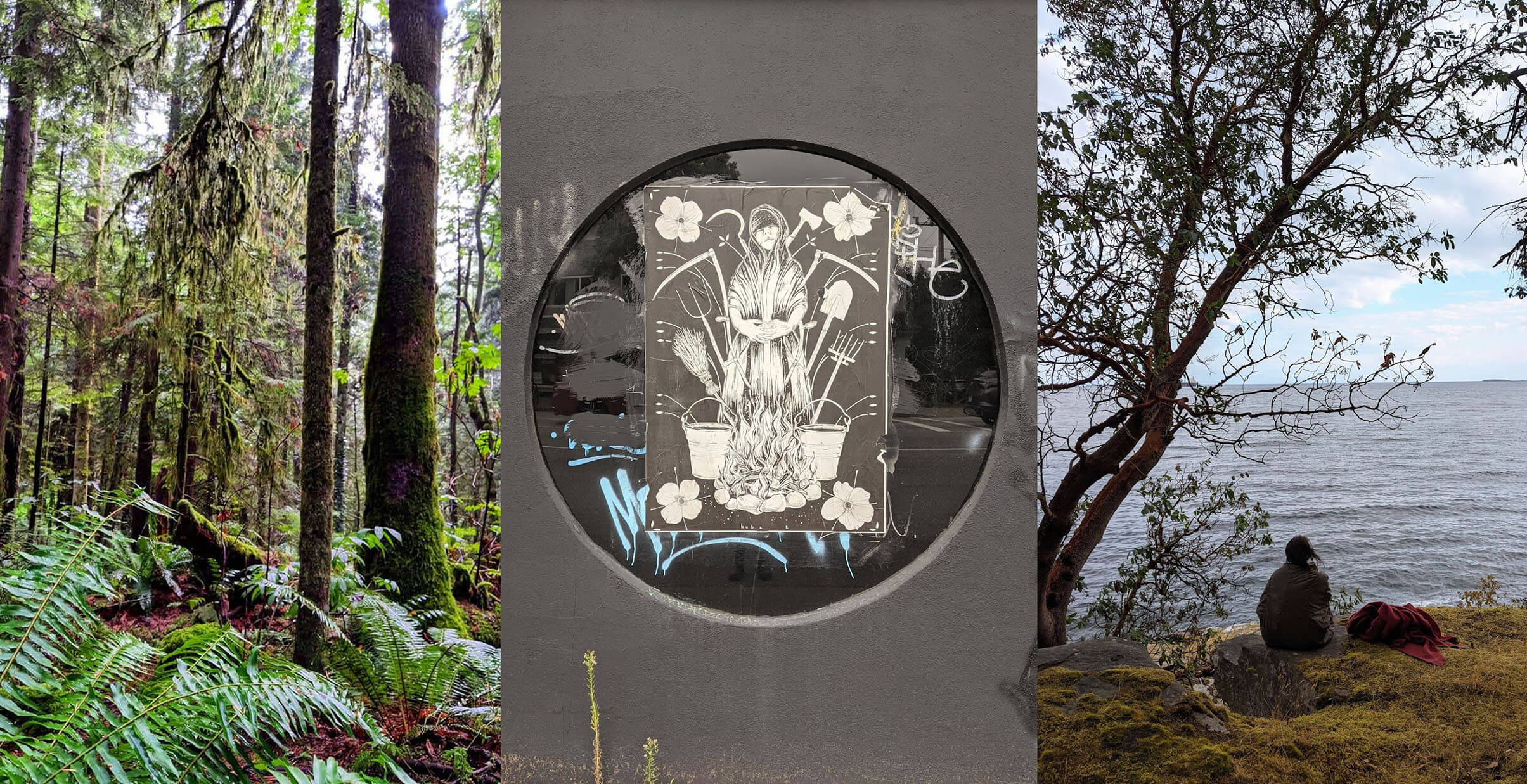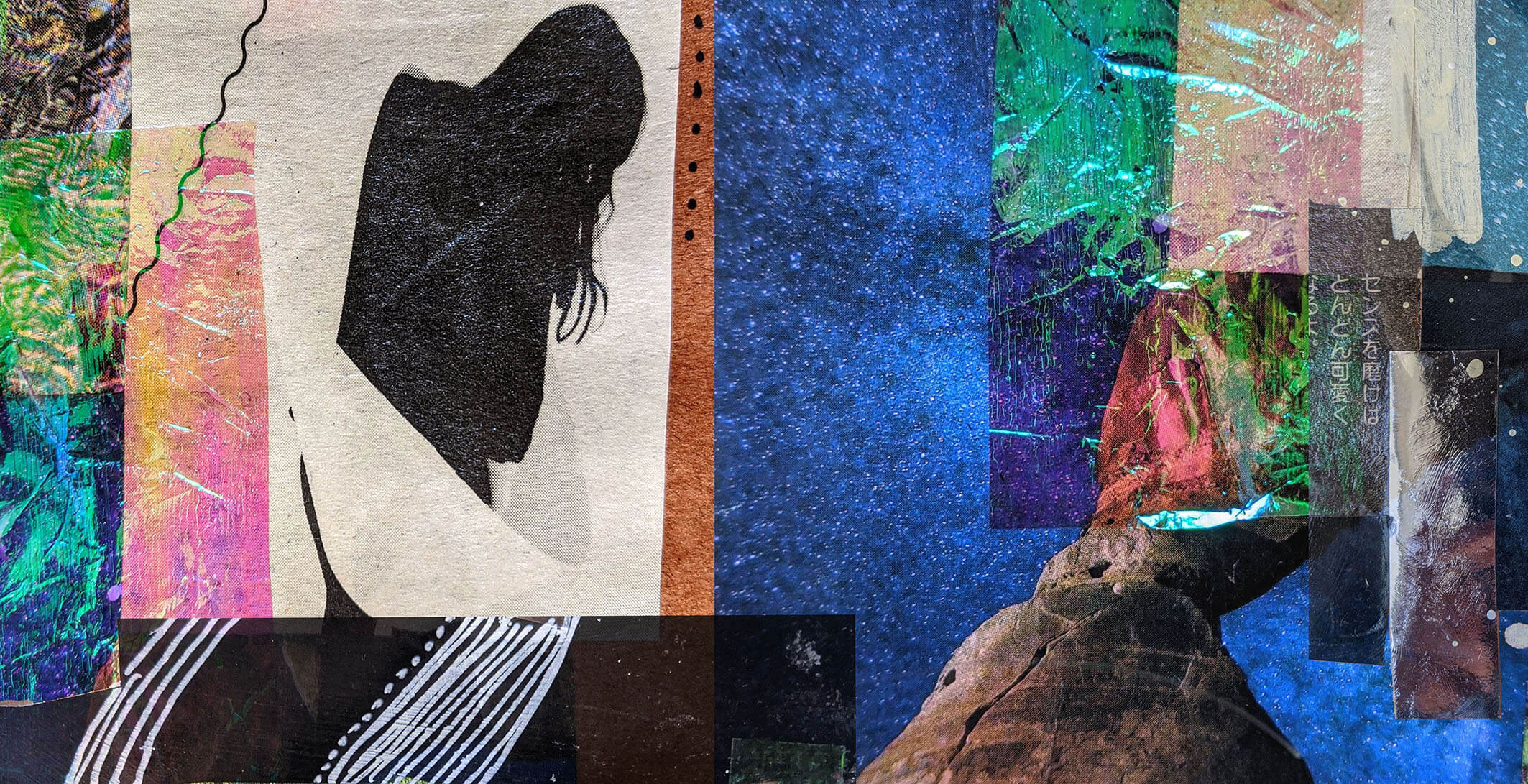To know the individual is to know the collective: Translocal encounters of the virtual community Art Tech Nature Culture
Kit BraybrookeJanuary 17, 2022 | Projects
We do not live in a simulation – a streamlined world of products, results, experiences, reviews – but rather on a giant rock, whose life-forms operate according to an ancient, oozing, almost chthonic logic. Snaking through the midst of the banal everyday is a deep weirdness, a world of flowerings, decompositions, and seepages, of a million crawling things, of spores and lacy fungal filaments, of minerals reacting and things being eaten away – all just on the other side of the chain-link fence.
– Jenny Odell, How to Do Nothing: Resisting the Attention Economy, p.126, 2019

Figure 1: Rainforest landscapes of Vancouver, Canada. Image by author.
As a new year emerges, I’ve been thinking about how the process of growing an interdisciplinary virtual community is a lot like meeting an event horizon – those moments in life where something shifts within ourselves and we perceive differently, a point from which there is no going back. Running through the temperate rainforests of Vancouver last summer, I realized I had never taken the time to get to know the trees I had been running past, and so I started to learn their names. At first, it was just a few – Western Red Cedar, California Redwood, Douglas Fir, Western Hemlock – but before I knew it, I had come to know over 30 species by name, each with its own characteristics and ways of living. The more species I met, the more I started to understand the current data that reveals how the seemingly disparate entities I had observed above the ground operate as a collective entity below it. Each is actively engaged in regenerating themselves, nourishing their neighbours, and communicating across immense multispecies networks to warn about incoming threats and share news and resources.
To know trees as individuals, we must also know them as a collective. A tree is no more an “I” without a “we” than a human is an “I” without a “we”. Each living entity is inextricably tangled in vast pluriverses of collaborators and compilers far beyond our imagination. This is the point of no return, a lesson from the realms of deep time. It is by no means a new lesson, but it tends to reframe things once it is heard.
And so it was that a more modest experiment was founded a year ago – one that aimed at crossing old boundaries and enabling new cross-feedings in a time of plague. Art Tech Nature Culture (ATNC) is a global community of practice for explorations into the creative possibilities of ecological regeneration. We look for opportunities to build new ways forward in precarious times that challenge and transform the many inequalities of the status quo. Our ways of addressing these inequalities are as diverse as our individual backgrounds, but we are united by a shared interest in using creative practices across disciplines (from arts, design, culture, and hacking to science, technology, and activism) to explore alternative futures that rethink, rebuild, and heal.
Like all ideas that roam wild and free, ATNC emerged from multiple discussions over many months, and soon became greater than the sum of its parts. It was birthed in between the collaborations of arts organizations and researchers across Europe associated with the project CreaTures (Creative Practices for Transformative Futures), and informed by recognizing the multiple challenges and complexities faced by folk who work in between disciplines and borders. To keep things simple, Lara Houston and I set up a classic email discussion list on JISCmail servers to share work and possibilities, hoping a few others might join us. Within a year, the community had welcomed over 350 members – a clear signal that the world of ecologically-minded creative practice is its own kind of pluriverse. Artist and writer Jenny Odell refers to this kind of congenial cohabitation as an “ecology of strangers”, and this depiction feels apt. While most of the members of ATNC have never met each other in person, there is nevertheless a spirit of generosity in the air, a sharing of space that involves reflection and refuge alike.

Figure 2: Art Tech Nature Culture. Artwork by author.
A core aspect of nourishing this ecology of strangers has been the discussions on the email discussion list, and the critical reflections and encounters that these have inspired. The boundaries of ATNC continue to evolve organically according to an ever-shifting constellation of communal efforts during people’s spare time. Members are currently testing out multiple routes for deeper connections and collaborative ventures, from a mutual aid buddy system and annual artistic residency to a monthly “natureculture” themed list takeover and collaborative Spotify playlist, where concepts of regeneration and resilience are explored through sound.
ATNC’s current curatorial-creative resident for 2021-22 is the artist Louise Beer, whose work explores humanity’s evolving understanding of Earth’s environments and the cosmos. Over the next year, she will be inviting members to reflect on the world’s changing ecosystems together through a series of creative and participatory encounters, including a live audio performance on January 27th entitled “A Memory of Darkness”, which was created using field recordings of bird song from Louise’s experience at Hinewai Reserve, in her native Aotearoa New Zealand. Alone, looking outwards over the Pacific Ocean, as the warm breeze rustled the native trees nearby and the Ruru (Morepork owls) sang out into the night, she explains that she experienced overwhelming feelings of wonderment and environmental grief in equal measure.

Figure 3: Earth reflection, and a memory of darkness. Artwork by Louise Beer.
There is much left to learn in these virtual spaces of experimentation and connection – and here we gain a great deal of inspiration from more established communities like 4S. As one member of ATNC puts it: “Similar to living in transition from one system to another, the central challenge of working/living/making in between disciplines is how to make ends meet, while also thriving in a space that is both profoundly exciting, and simultaneously uncomfortable.”
While we have been limited so far in using English as the group’s working language, it has been a wonderful surprise to see just how diverse a virtual community can become in its translocality. When asking members to share their reflections about the group and its central topics in surveys and call-outs, we received a variety of thoughtful responses worldwide. From a member in Sydney, Australia: “[ATNC] is an incredibly rich and engaged community of practitioner-researchers, all over the globe, committed to finding ways to adapt and transition to better ways of living in and through the compounding ecological and social crises of our time. […] I’ve experienced a sense of a movement, and an ethos that is diverse, global, supportive and not competitive, [which] can be an incredibly disheartening aspect of academia.” From a member living in Portugal by way of Brazil: “Even though I don’t have a background in arts or design, I have seen examples of activities to be developed with local communities that I can replicate in my research and work contexts, [so there is] learning in perceiving the different voices and cultures, and also a union in searching more ecological and fair societies.”
Another core thread running through many of these encounters has been an acknowledgment of the value of finding continued ways to reach across the limitations of disciplines and borders alike, something that virtual communities remain uniquely positioned to facilitate. A member in the Netherlands wrote about how their encounters with ATNC became a reminder that “there are people out there who care a lot more than we know”. Another member from Skopje, North Macedonia reflected that they had “received validation for my ideas, imaginations, feelings which I didn’t realized I craved […] people and projects that are extremely insightful and inspiring. I’ve realized that we don’t need to have much more than a shared interest to be in touch with each other.”
We also asked members to describe what ecological regeneration means to them – a difficult ask in the best of circumstances, not to mention a global pandemic. Their careful responses illustrated a nuanced understanding of the dynamics of this concept in all its myriad facets:
- “[I think of] a complex set of processes and events that must happen, on a global scale, if we are to have a liveable planet, for humans and nonhumans alike.”
- “On a local scale, rewilding (where appropriate) and protecting/preserving/planting native species to encourage place-appropriate biodiversity as well as shifting attitudes and values of the community and leaders with regards to human custodianship of our bioregions. On a global scale, political and business prioritisation of future-focused decision making over short-term profit and growth.”
- “The ecological crisis is just a reflection of the social crisis. So, if we think about an ecological regeneration, we have to assume the need for profound changes in social relations. It is necessary to return to the common ground […] Ecological regeneration is rethinking hierarchies, approaching instead of moving away.”
As extreme climatic events ravage homes and livelihoods around the world with increasing frequency, members have also started to share how their own life experiences of the earth’s fragilities motivate their work:
Greece is burning as we speak. Among the many images in the news, I am really touched by people trying to save their animals, dogs, horses, sheep. People crying about lost centuries old olive trees, and the haunting photo of a bird mother that stayed to die her eggs instead of fleeing. I am sure that this love and care is not unique to those human and other beings; it is just the gravity of the moment that makes it clearly visible. Living in a world guided by this love, would be a world that is ecologically regenerated.
It seems that just as we must understand a forest as a collective to acknowledge its trees as individuals, the process of getting to know a virtual community also requires that we recompile all that came before. Alone, we may face climate grief and instability, but together we rebuild. All members of 4S who are up for a bit of experimentation in the wild are enthusiastically invited to join the ATNC ecosystem and hatch new possibilities alongside other like-minds. Details on how to sign up to the community and RSVP for the ‘Memory of Darkness’ audio performance on January 27th can be found at atnc.persona.co – looking forward to meeting you in the woods.
Author’s note:
The author would like to thank the many contributors of ATNC who helped bring this piece to life by responding to members’ surveys and discussions. Special thanks go to Zoe Sadokierski, Daniel Oliveira, and Cristina Ampatzidou for sharing such impactful experiences and Steering Committee members Bryony Benge-Abbott, Lizzie Crouch, Sophie Huckfield, Candace Hope, Lara Houston, Ann Light, Miranda Marcus, and Iryna Zamuruieva for the continued inspiration.
___________________________________________________
Dr. Kit Braybrooke is a social scientist and artist-designer whose approach spans anthropology, geography & STS with a focus on regenerative cultures, urban placemaking and feminist tech futures in Europe, Asia and Canada. They are a director of Studio Wê & Üs, which helps civil society organisations foster sustainable development through creative participation, and Senior Researcher with Habitat Unit at Technical University Berlin. They gained a PhD from University of Sussex Digital Humanities Lab for ‘Hacking the Museum’, a study of the UK’s first museum makerspaces at Tate, British Museum and Wellcome Collection. kitfox.org | studiowe.org
Published: 01/17/2022
